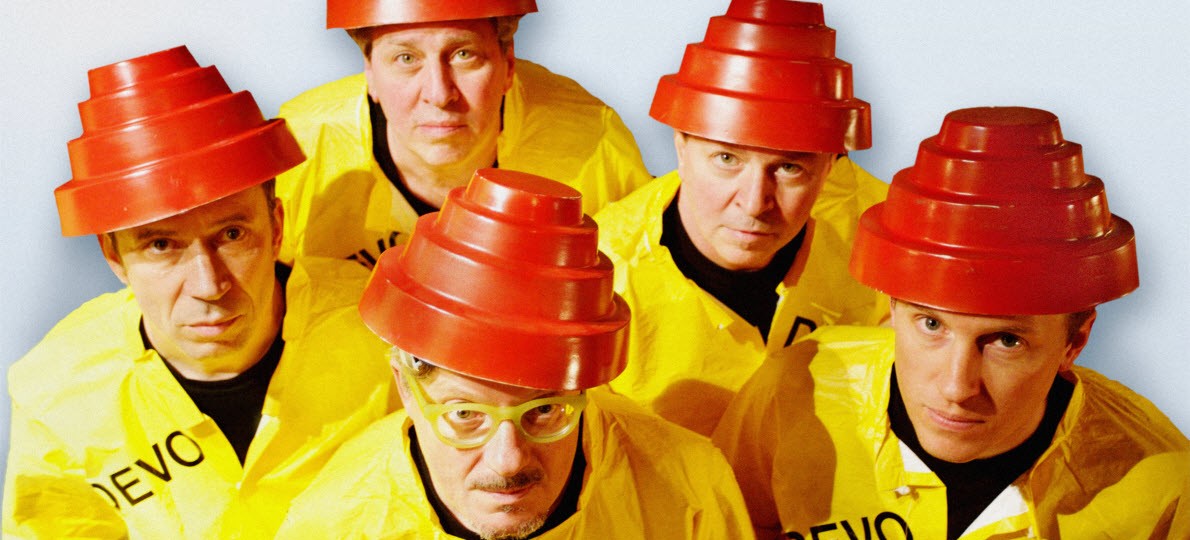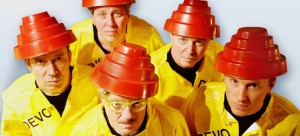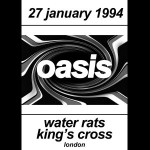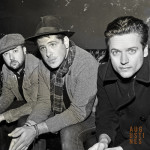Originally published in 2007, we re-publish an interview with Devo’s Gerry Casale on the sad occasion of his brother Devo guitarist Bob Casale’s passing.
When Gerry Casale and his brother Bob met fellow art students Bob Lewis and siblings Mark and Bob Mothersbaughin at Kent State University, they began to create pieces around the idea of “De-evolution,” the theory that mankind, rather than progressing, was actually going backwards. Developing their ideas initially through film and art, when they returned to Cleveland, Ohio in 1972 they formed a six-piece musical group now including Alan Myers, called DEVO. They aimed to subvert pop, through the use of minimalist electronic sounds, and regimented punk rhythms. Their futuristic stage costumes and confrontational live performances burnt their imagery into pop history. They were one of the first acts to embrace the MTV age and with their music and visuals, they parodied and deconstructed the world around them. They were a playfully postmodern pop band before anybody in the mainstream knew what that word meant, and their work still informs many modern acts today (Polysics, Hot Chip, Clor etc).
Their first album Are We Not Men? A: We Are Devo was produced by Brian Eno in Germany and featured a radical cover of the Rolling Stones ‘(I Can’t Get No) Satisfaction and the controversially titled ‘Mongoloid.’ By 1980 they released their best album, FREEDOM OF CHOICE, honing their pared-down pop to produce the razor-sharp ‘Girl You Want‘ and the million-selling pop of ‘Whip It.’ 15 years on from their last tour of Europe, they are all set to venture onto these shores again with a tour starting next week, including a date on Jarvis Cocker‘s Meltdown festival bill. I caught up with founding member and bassist Gerry Casale on the phone from LA, for a chat about where Devo’s take on music stands in 2007.
When did Devo first meet? How did the concept for Devo come about?
I met Mark at Kent state university in the early seventies, and we started experimenting and Devo went from an idea to reality. Mark and I were artists and the idea was actually originally visual. At that time there was no real term as deconstruction, or postmodern. When we look back, that’s what we were doing, but we didn’t know it consciously. We thought man was extremely flawed and the worst part of human nature was taking centre stage, there wasn’t progress or journey of humanity. So later on we started making music that embodied that idea.
What kind of musical influences did you have early on?
The musical influences didn’t just come from within music and rock n roll. We liked songs by Captain Beefheart, and even stuff like Slade. But we were influenced by some of the early German electronic stuff, plus all the Sci-Fi and game show junk from the 70s.
How did you end up on Stiff records in the UK?
That’s because we had some 45s we put out in America, some of them got taken over to the UK and Dave Robinson at Stiff liked the singles and he contacted us and wanted to be the distributor for Europe.
Did you feel any affinity with the late seventies Punk scene in the UK?
We certainly liked some of the early punk stuff, but we knew we couldn’t be like that. That kind of music was informed by the kind of mentality of growing up in the UK, there was also an intellectual nihilism that we couldn’t do. We were more like Punk Scientists, we weren’t saying we were bored and fuck you we were saying, ‘fuck you’ creatively like ‘fuck you by fucking with your mind’. We loved the Clash more than any of the punk bands when we finally saw them live at Bonds in 1980 it was one of the best shows I’ve ever seen.
What impact did the David Bowie gig at the Public Auditorium, in Cleveland, Ohio, in 1974 have on you?
That was definitely a call to arms, all the ideas we had and here was somebody doing something amazing, while it’s not the same as what we were trying to do, but it definitely stopped us talking about things and get on and do something.
Your look is very striking how much thought went into your look? The military boiler suits, red hats etc.
That started because it was very cheap to do, we needed something we could all wear. We didn’t want to do what everybody else was doing t the time, dressing up as cool as they could, dicks and ass, guys in spandex platform shows and big hair, we laughed at that. We wanted to present a drill piece, something very austere and modest because that’s all we could afford at the time. As soon as we got into the confrontational performance with the audience they would rip off the suits, and it became a ritual every time we played, it kind of got out of control.
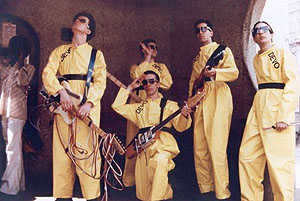
Did you use a lot of film on stage? I read about your first film ‘The Truth About Devolution’?
When we started, yeah. What happened was we entered that into in the Ann Arbor Film Festival. There used to be a true distribution for art house film, we got it in there and it won a prize. It travelled with the winners, and that’s how Kip Cohen at A&R Records found Devo, he believed the band was a real band, not just a concept, he asked us to come to LA for a showcase. I pretended to be our manager, I delayed it three months till the summer, and we practised really hard until we had a polished forty-five-minute set. Then he put us out there, watched us once, and said no.
How was working with Brian Eno on your first record?
That whole experience was surreal and great. Here we are flying out of Cleveland Ohio to Cologne and being driven to a deserted farmhouse by a guy who looked like a Viking with a big beard and no shirt. The album (Q: Are We Not Men? A: We Are Devo!) reflects the fact that we were in a pressure cooker of a situation, out of our element in Germany in a farm house, working twelve hours in the studio, seeing nobody except Connie Plank and Brian Eno, experimenting with effects, only having three weeks to put that whole record together and that’s the result its really intense and that record’s intense.
When did you begin to use electronic instruments?
That was the idea from the beginning. Mark was the only person I knew in all of Ohio who had a Mini Moog synthesizer and an Odyssey, and he was really interested in using them in experimental ways, pure tones and noise, and trying to run them through effects pedals and stuff, so it was the opposite of Emerson, Lake and Palmer, who were trying to make them beautiful and make them a fake orchestra – we just thought that was corny. We were brutal minimalists on purpose.
Are we not men? We are Devo?! Do you get sick of people asking you that question?
We were very thoughtful, we had plenty of time to incubate, and we didn’t do anything that was just throwaway or shallow, so coming up with that title we knew it would stay with us forever, it’s like a non-sequitar almost. How does it answer that question, because we’re something other than men, we were reflecting culture, we weren’t saying we weren’t part of this. Now it’s clear Devolution is real, there are a lot of people who’ve used it in articles, and magazines – it was in the New York Times a few weeks ago about the devolving situation in Iraq. It’s as if some gipsy had shown you a crystal ball in 1980, and said ‘here’s the world.’
What was your most famous single ‘Whip It’ about?
It’s not about S&M OR masturbation. When they said that we went with it because we knew that’s what would make it popular. I was just doing an exercise of imitating Thomas Pynchon in Gravity’s Rainbow. He was just doing these parodies of poems and limericks and they were all to do with you’re number one, you’re special, all this American crap, con man stuff. So Whip it was just my attempt to be inspired by Thomas Pynchon.
35 years of Devo, what’s been your best memory of your time in the band?
There have been a lot of incidents I suppose one of the most defining moments was when Richard Branson talked us into playing the Knebworth festival and we were on before Genesis and were staring out all these hippies who fucking hated us, and we went into Smart Patrol (‘We’re the smart patrol nowhere to go’) and they started throwing things at us, but the stage is so high above the ground, so they started hitting other people in the crowd with the cans and stuff, so the people at the front who wanted to see us turned on them and was this huge fight going on and we could see it all! It was just perfect, it took us back to when Devo started in Ohio when people would threaten us to quit playing.
I read that you’ve done some direction work?
I used to direct our own videos, then I worked in London with Godley and Creme at a company called Media Lab, I came back here and started directing, I did videos for the Foo Fighters and Soundgarden, and I keep trying to get a film off the ground. I optioned the life rights on a true story based on the Thunder ball, a movie about these two guys who borrow money from their parents to build a rocket belt, it all goes disastrously wrong ‘its devo’.
How’s the Devo film (The Beginning Was the End) coming along?
We’re working on the Devo film with Matt Dale, that script ought to be finished by August then we’ll see what we can do. I call it Spinal Tap with brains, it’s just as funny as Spinal Tap, but more outrageous because you’re dealing with this art band trying to get out of the drudgery of Ohio, only to dubiously make it out to California to get involved in something far uglier.
What do you feel was Devo’s best album?
That would have to be Freedom Of Choice, it was the turning point where we started to develop a new aesthetic that connected us to a wider audience, but we still had everything that had gotten us to that point. It was a good hybrid, it had the best of the cult world and the larger mass audience appeal.
Why the long (15-year) gap between visits to the UK/Europe?
There just wasn’t interest for us to go there, we played a bunch of dates in America last year, we did twenty cities and Lollapalooza, it went really well, but nobody came forward from Europe.
What can people expect from a Devo show in 2007?
It’s like back to the future, we went so far ahead that now when we do what we do, it’s just like the present, not the past, just to see grown men acting and sounding so weird, it ought to scare the hell out of 20 year olds.
So in a way you feel Devo are more relevant than ever then?
Since we weren’t just about style but were a substance, nothing has changed. It’s only got more true. We were freaked about Ronald Reagan in 1980 and here we are with Bush who makes Ronald Reagan look like a ray of light. Now we live in a corporate feudal state, he’s like a totalitarian ideologue and a moron on top of it. He’s on the wrong side of every issue that matters to the future of humans on the planet. It’s just creating this negative energy on a global scale. Him and Osama Bin Laden are like two sides of the same coin. Here you’ve got a Christian fundamentalist and you’ve got a Muslim fundamentalist and they’re poking each other, holding the whole world hostage, and anybody that’s a rational humanist loses.

